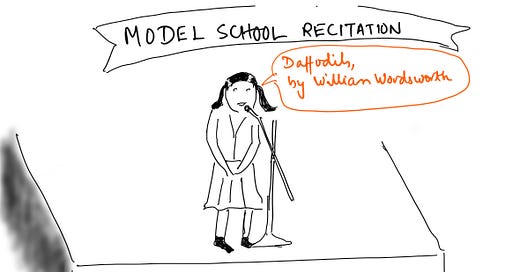Montek Singh Ahluwalia, an economist and civil servant who played a telling hand in charting India’s growth path in the 1990s and 2000s, reminisces about his college days at St. Stephens in Backstage, a loose memoir:
The real problem with debating in Delhi was that it did not really hone the art of persuading people to change their minds, or even rethink their positions. It certainly taught us the art of public speaking. Later in life, when faced with the challenge of having to persuade senior people in government to change their way of thinking on economic policies, I realized the art of persuasion is very different from the art of debating, and much more challenging.
In college I was fascinated by this friend who was a regular on the debating circuit and had a number of successful finishes on the podium.
My curiosity stemmed from the strange contrast between my friend’s public and private speaking skills. He may have won debates but he had a kind of bookish air about him. In fact, a number of us from the batch saw our orator friend as pedantic—a species most twenty year olds are happy to take potshots at.
On the other hand, there was another batchmate, not a man of books but an operator in the real world. No one ever saw him up on a stage arguing for or against a topic with the intention of winning a competition. He was not a man for the stage; he was grounded. This friend was a member of the Rotaract Club. He was good with people and good at corralling them for all the reasons undergrads need corralling. He was persuasive without ever having to launch into a public exposition. He got things done.
This leads me to a broader question about the point of education. Sometimes I feel the success metric of our education system is less to do with imparting knowledge and skills and more to do with filtering. It doesn’t matter on what parameters as long as those can easily be measured.
It is near impossible to objectively measure someone’s persuasiveness but much easier to evaluate their oratory skills. As a life skill, oration is not a patch on the ability to persuade. Much like how your quantitative aptitude does not belie your decision-making, nor does rote learning reveal your ability to synthesize information.
In fact, being put through the rigor of a system that measures you on irrelevant objective parameters, the art will shape the artist. If you've been told all your life how good a debater you are, you're likely to find it a wise idea to argue your way out of every disagreement, be it with your boss or spouse. Your choice will most likely combust in your face. It is a double whammy. Not only will you fail you will also be left scratching your head. Same behavior, wildly different outcome.
Karthik Muralidharan, an eminent economist and someone who has written at length on the Indian education system, calls it the “sorting function” of our education system. He presents it as a fundamental design challenge of the Indian education system.
To get Muralidharan’s appraisal you don’t have to go farther than Namesake. In the movie adaptation of Jhumpa Lahiri’s book of the same name, Ashima (played by Tabu) recites William Wordworth’s Daffodils to Ashoke (played by the late Irrfan) as part of a performance intended to impress the groom’s side when the families meet to fix marriage between the two. Ashima’s rendition may tug at your heartstrings but until you understand the sorting function of Indian education you may not fully grasp the meaning of it.
In his chapter titled Reforming the Indian School Education System from the book What the Economy Needs Now, Muralidharan writes:
Thus, a fundamental goal for Indian education policy has to be to move the education system from a “sorting” and “selection” paradigm to a “human development” paradigm, one that will empower every citizen to be educated enough to have the foundation needed for a lifetime of continuous learning in whichever area of skill he or she may seek to learn.
There’s a direction for the future.
👋Hi, I’m Satyajit and thank you for your time. I learn from the best with the goal of unpacking lessons that help make decisions for a better career and a better life.




